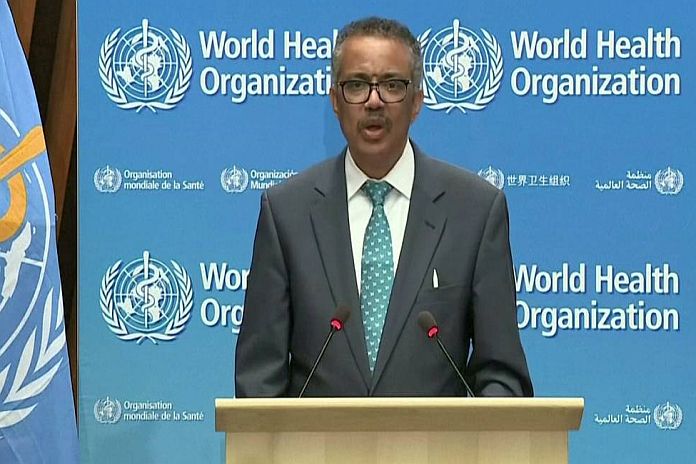By Caribbean News Global ![]()
GENEVA, Switzerland — On the 75-anniversary celebrations of the founding of the United Nations the nations of the world came together in the aftermath of the World War II to resolve that the only alternative to the horrors of international conflict was international cooperation, World Health Organisation (WHO) director-general Dr Tedros Adhanom Ghebreyesus, said at a COVID-19 media briefing Monday.
“Perhaps no crisis since World War II has demonstrated more clearly why we need the UN than the COVID-19 pandemic. We can only confront this common threat with a common approach. WHO is proud to be part of the UN family,” he said.
As the nations of the world meet virtually for the UN General Assembly this week, WHO has three key messages:
First, the pandemic must motivate us to redouble our efforts to achieve the Sustainable Development Goals, not become an excuse for missing them.
Second, we must prepare for the next pandemic now. And third, we must move heaven and earth to ensure equitable access to diagnostics, therapeutics and vaccines.
WHO director-general, Dr Ghebreyesus, said: “We continue to call on all countries to use every tool at their disposal to suppress transmission and save lives, until and after we have a vaccine. From the beginning of this crisis, WHO has championed and supported the global effort to develop a vaccine. We have developed target product profiles, criteria for the prioritization of vaccines and a core vaccine trial protocol. We have engaged with vaccine developers and academics to standardize lab assays, animal models, and other normative methodologies.”
We are also helping to match manufacturers with trial sites, WHO director-general explained:
“In April, WHO, the European Commission and many partners established the Access to COVID-19 Tools Accelerator, to speed up the development and manufacturing of vaccines, diagnostics and therapeutics – and to ensure fair and equitable access for all countries.
“Together with Gavi and the Coalition for Epidemic Preparedness Innovations, CEPI, we also established the COVAX Facility, which will give participating countries access to the world’s largest and most diverse portfolio of vaccine candidates,” he added. “The overarching goal of the COVAX Facility is to ensure that all countries have access to vaccines at the same time, and that priority is given to those most at risk, including health workers, older people and others at the highest risk. We have no guarantee that any single vaccine now in development will work. The more candidates we test, the higher the chance we will have a safe and efficacious vaccine,” director-general, Dr Ghebreyesus said, while working towards a vaccine.
WHO director-general told the media briefing on Monday, that almost 200 vaccines for COVID-19 are currently in clinical and pre-clinical testing:
- The history of vaccine development tells us that some will fail, and some will succeed. The COVAX Facility enables governments to spread the risk of vaccine development and ensure their populations can have early access to effective vaccines.
- Even more importantly, the COVAX Facility is the mechanism that will enable a globally coordinated rollout for the greatest possible impact.
- The COVAX Facility will help to bring the pandemic under control, save lives, accelerate the economic recovery, and ensure that the race for vaccines is a collaboration, not a contest.
“This is not charity, it’s in every country’s best interest. We sink or we swim together,” he stressed. “The fastest route to ending the pandemic and accelerating the global economic recovery is to ensure some people are vaccinated in all countries, not all people in some countries. Recent opinion polls show the overwhelming majority of people support equitable access to vaccines. Our aim is to have two billion doses of vaccine available by the end of 2021. We are encouraged to see a large number of countries signing up to the COVAX Facility.”
WHO director-general, Dr Ghebreyesus, acknowledged to “some daunting challenges” added, “for the ACT Accelerator to work as planned, it must be funded. So far, USD $3 billion has been invested. This has resulted in a very successful start-up phase, but it is only a tenth of the remaining $35 billion needed for scale-up and impact.
“Fifteen billion dollars is needed immediately to maintain momentum and stay on track for our ambitious timelines. Our challenge now is to take the tremendous promise of the ACT Accelerator and COVAX to scale. We are at a critical point and we need a significant increase in countries’ political and financial commitment. This isn’t just the right thing to do, it’s the smart thing to do,” WHO director-general Ghebreyesus said at the media briefing on COVID-19. “Our estimates suggest that once an effective vaccine has been distributed, and international travel and trade is fully restored, the economic gains will far outweigh the USD$38-billion investment required for the ACT Accelerator,” he said.





